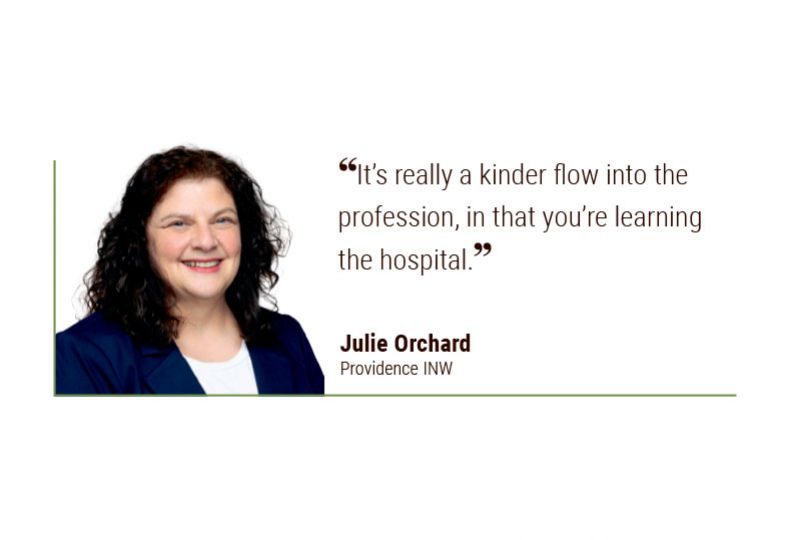Providence, WSU collaborate to address nurse shortage
Partnership aims to keep workforce pipeline open

Providence has partnered with the Washington State University College of Nursing, in Spokane, to provide the school with registered nurses to instruct classes for its RN program.
The mutually beneficial partnership, which began about a year ago, allows WSU to continue accepting full cohorts of nursing students, which in turn should help Providence address an ongoing nurse shortage, says Julie Orchard, Providence’s chief human resources officer for its Inland Northwest region.
“(WSU) approached us, and they were having trouble filling their educator roles, and it looked like they might have to reduce the number of nurses they were going to put in their program,” Orchard says. “We really needed them to be taking a full load of nurses, because we’re in a demand for nurses.”
The nurse shortage is a lasting effect of the COVID-19 pandemic, she contends.
“We currently have over 300 RN positions open, just in our service area,” she says. “There’s still a shortage.”
Providence has made some progress addressing the lack of RNs, but there’s still work to do to fill the open positions, Orchard says.
WSU nursing students, along with students from other accredited nursing programs, can apply to participate in Providence’s nurse technician training and development program, which acts as a pipeline from WSU to Providence, Orchard says.
“We’re able to allow students to come into our workspace and they work up to 20 hours, not as a nurse, but up to the scope of what they’ve learned so far in the nursing program,” she says. “We classify them as nurse techs.”
Upon graduating the nurse tech program, students that join Providence’s workforce are offered $5,000 in student loan forgiveness, Orchard says.
“It’s really a kinder flow into the profession, in that you’re learning the hospital. You’re learning the work as you progress through your education, and then in the end, you’re familiar with Providence,” she says. “It definitely benefits us because they like to stay with us once they’ve gotten into our workforce.”
It was through the nurse tech program that Providence learned of WSU’s instructor shortage and the potential ripple effect it would have on the school’s number of nursing students, Orchard says.
Currently, two Providence RNs are working part time as instructors at WSU, Orchard says. When they aren’t teaching at WSU, they are assisting with the nurse tech program and Providence’s six-week certified nursing assistant programs.
Providence pays the two RNs, allowing them to maintain a full-time employment status, and then is reimbursed by WSU, Orchard says.
One of those RNs is Diane Martinez, who has been with Providence for almost 12 years. Martinez says she has a passion for teaching and recognizes the immediate need for more health care educators.
“Previously, I was a manager for the spinal cord unit at St. Luke’s, and I really missed teaching,” she says. “I was an educator previously.”
Martinez says her first year instructing WSU classes was a learning experience.
“It was a lot of learning, a lot of balancing time,” she says. “I feel like this semester is actually the true tale of how to really balance.”
In a typical week, Martinez works three days as a clinical instructor at WSU and two days as a professional development specialist with Providence, she says. In her Providence role, Martinez works directly with students in the nurse tech and CNA programs, some of whom are also in the classes she teaches.
Martinez calls the dual position “ingenious,” because it gives students a familiar face they are comfortable reaching out to while in the Providence programs. She says she hopes Providence will have the opportunity to partner with other local schools that have nursing programs.
The partnership also allows students to stay current with what’s happening at Providence, Martinez says.
“They’re up to date on policies, they’re up to date on any changes to education, any safety alerts that they have in the hospital,” Martinez says.
Another benefit of the partnership is that instructors can teach students clinical practices the way they are expected to be done at Providence, Martinez says. In other instances, there can be a disconnect for students entering the workforce, because some instructors and employers may have different ways of doing things.
WSU students also benefit from being taught by RNs who have recent experience in the nursing field, Orchard says.
“These folks were just a year ago in patient care and probably through the hardest time in a long time through COVID,” Orchard says. “They can really open the eyes of the students as to what they might face in the patient role—not just the strenuous parts but the really good parts of patient caring.”
It’s important for students to hear about real-life experiences of RNs, Orchard says.
Providence would be open to providing more nurses to teach classes at WSU if there is a need, Orchard says. The partnership will continue to be evaluated as long as WSU needs RN instructors, she adds.
“It not only benefits Providence, it benefits the community,” Orchard says. “I don’t see it going away anytime soon.”
Related Articles





